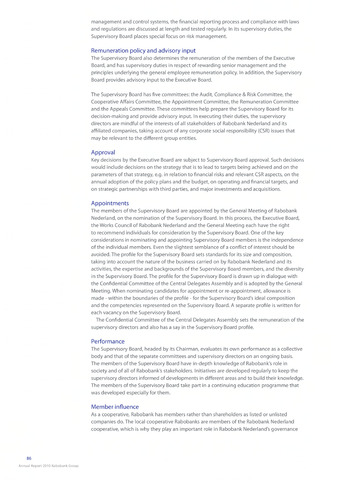management and control systems, the financial reporting process and compliance with laws
and regulations are discussed at length and tested regularly. In its supervisory duties, the
Supervisory Board places special focus on risk management.
Remuneration policy and advisory input
The Supervisory Board also determines the remuneration of the members of the Executive
Board, and has supervisory duties in respect of rewarding senior management and the
principles underlying the general employee remuneration policy. In addition, the Supervisory
Board provides advisory input to the Executive Board.
The Supervisory Board has five committees: the Audit, Compliance Risk Committee, the
Cooperative Affairs Committee, the Appointment Committee, the Remuneration Committee
and the Appeals Committee. These committees help prepare the Supervisory Board for its
decision-making and provide advisory input. In executing their duties, the supervisory
directors are mindful of the interests of all stakeholders of Rabobank Nederland and its
affiliated companies, taking account of any corporate social responsibility (CSR) issues that
may be relevant to the different group entities.
Approval
Key decisions by the Executive Board are subject to Supervisory Board approval. Such decisions
would include decisions on the strategy that is to lead to targets being achieved and on the
parameters of that strategy, e.g. in relation to financial risks and relevant CSR aspects, on the
annual adoption of the policy plans and the budget, on operating and financial targets, and
on strategic partnerships with third parties, and major investments and acquisitions.
Appointments
The members of the Supervisory Board are appointed by the General Meeting of Rabobank
Nederland, on the nomination of the Supervisory Board. In this process, the Executive Board,
the Works Council of Rabobank Nederland and the General Meeting each have the right
to recommend individuals for consideration by the Supervisory Board. One of the key
considerations in nominating and appointing Supervisory Board members is the independence
of the individual members. Even the slightest semblance of a conflict of interest should be
avoided. The profile for the Supervisory Board sets standards for its size and composition,
taking into account the nature of the business carried on by Rabobank Nederland and its
activities, the expertise and backgrounds of the Supervisory Board members, and the diversity
in the Supervisory Board. The profile for the Supervisory Board is drawn up in dialogue with
the Confidential Committee of the Central Delegates Assembly and is adopted by the General
Meeting. When nominating candidates for appointment or re-appointment, allowance is
made - within the boundaries of the profile - for the Supervisory Board's ideal composition
and the competencies represented on the Supervisory Board. A separate profile is written for
each vacancy on the Supervisory Board.
The Confidential Committee of the Central Delegates Assembly sets the remuneration of the
supervisory directors and also has a say in the Supervisory Board profile.
Performance
The Supervisory Board, headed by its Chairman, evaluates its own performance as a collective
body and that of the separate committees and supervisory directors on an ongoing basis.
The members of the Supervisory Board have in-depth knowledge of Rabobank's role in
society and of all of Rabobank's stakeholders. Initiatives are developed regularly to keep the
supervisory directors informed of developments in different areas and to build their knowledge.
The members of the Supervisory Board take part in a continuing education programme that
was developed especially for them.
Member influence
As a cooperative, Rabobank has members rather than shareholders as listed or unlisted
companies do. The local cooperative Rabobanks are members of the Rabobank Nederland
cooperative, which is why they play an important role in Rabobank Nederland's governance
86
Annual Report 2010 Rabobank Group

